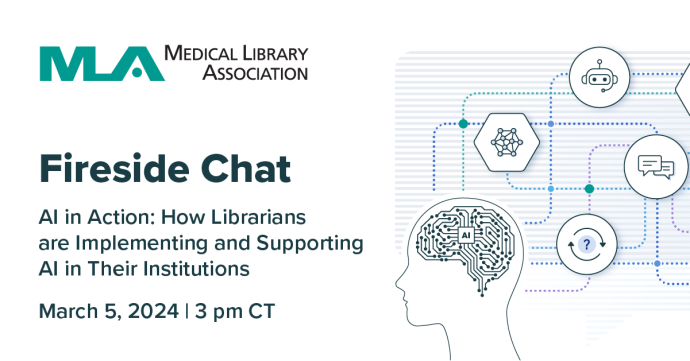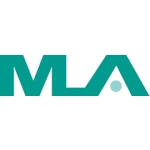MLA is excited to offer the second of its free offerings on AI for medical librarians.* We’ve asked the presenters and moderator of the Chat to answer a few questions about their interest in Generative AI and what you can expect from their session.
Register here to join Michelle Cawley (MC), Justin Clark (JC), Fred LaPolla (FL), and Gabe Rios (GR) (left to right) for their free session on Tuesday, March 5, 2024, 3:00 - 4:00 p.m., central time.




How did you get interested in your topic and what most excites you about it?
MC: Around 2012, I was supporting the US EPA in conducting comprehensive literature searches for human health risk assessments. They were moving towards very broad literature searches that yielded 10,000 or more results. Manually screening all search results (with two independent reviewers) was not efficient or effective with searches of this size. At my consulting firm, we started to explore using machine learning algorithms to assist during the literature screening step, and we had great results. I still love this work, because it’s not one-size-fits-all and research teams are so appreciative of the expertise we bring as health sciences librarians. Every research question is unique, and it’s exciting to work with teams to design a solution that works for them.
JC: Friends and colleagues of mine published a paper on using ChatGPT to design searches, and the results of the study prompted my interest in using it myself. I am excited to see how AI is progressing in supporting the building of more efficient searches.
FL: I found AI to be very helpful in drafting teaching materials, particularly in creating multiple choice quiz questions. Later, I found it to be very helpful in generating course material. I really enjoy using Generative AI to save time on mundane tasks.
GR: My initial interest in AI stems from serving on the Biomedical Library and Informatics Review Committee in the previous decade. Some bleeding edge proposals incorporated Natural Language Processing (NLP) into their research projects. I was fascinated by this type of AI! I am most excited about the potential for generative AI to enhance the discoverability of evidence-based information in a more expedient manner.
What will attendees learn about how AI is changing the way librarians do research and education?
MC: Attendees can expect to learn why health sciences librarians are well-positioned to consult with research teams on applying AI to bibliographic data and to gain ideas for how to get started using AI.
FL: Attendees will learn about ways they can participate in an AI rollout, including offering training to their communities, and how to use it in their daily workflows to save time and energy.
JC: They will learn where the strengths of AI currently lie, where it could be used, and where, at the moment, it cannot be used.
GR: Highlights of how librarians are already integrating AI into their operations.
What’s the main thing you want attendees to take away from the Fireside?
MC: With the advent of Generative AI, the appetite for automating systematic reviews and other comprehensive searches is increasing. By gaining AI literacy and pairing it with existing expertise, health sciences librarians have an exciting opportunity to partner with research teams in a new way.
FL: It is possible for anyone with interest to learn to leverage AI in their library for routine tasks.
JC: AI is not taking our jobs, at least not yet.
GR: AI is another transformative innovation in our profession. I would like for attendees to come away from the chat being aware of case studies of AI use in libraries.
*The first offering: A Toolkit for Evaluating AI Tools: Using and Evaluating Generative AI (Passcode: yF$?49dD)




